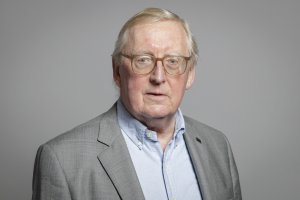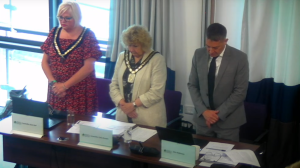We don't think religious worship should play any part in the formal business of the state.
We want to see parliamentary and local government meetings conducted in a manner equally welcoming to all attendees, whatever their personal beliefs.
Parliamentary prayers
Sittings in both the House of Commons and the House of Lords begin with Anglican prayers. MPs and peers stand for prayers facing the wall behind them – a practice thought to have developed due to the difficulty members would historically have faced of kneeling to pray while wearing a sword.
When the chamber is at its busiest, parliamentary prayers act as a bizarre and antiquated seat reservation system. Even MPs and peers who are slated to speak have no option but to attend prayers in order to reserve a seat.
Whilst they may be viewed by some as an important tradition, parliamentary prayers serve to assert the superiority of Christianity (and the Church of England in particular) at Westminster. This 'tradition' is inimical to a modern, pluralistic, secular democracy.
In the Scottish Parliament, Tuesday afternoon sessions begin with 'Time for Reflection', with faith and belief representatives invited to addresses members for up to four minutes. The Northern Ireland Assembly begins formal business with a period of two minutes of silent prayer or contemplation. The Welsh Assembly has adopted no such rituals.
Parliamentarians who wish to pray are free to do so. But prayers should not form part of the official business of Parliament.
Council prayers
Many local authorities in Britain also begin their meetings with prayer.
Local democracy should be equally welcoming to all sections of society, regardless of their religion or belief. Council meetings should be conducted without anyone feeling excluded, or compelled to either participate in prayers or absent themselves from part of the meeting.
Council prayers open the door to wholly unnecessary conflict and sectarian squabbles within local authorities. There is a history of local councillors being bullied and marginalised for challenging council prayers.
The absence of prayers from the formal business of meetings in no way impedes religious freedoms or denies anybody the right to pray. Conversely, organised worship in secular settings imposes worship on those who do not share the faith. A genuine commitment to freedom of religion or belief is incompatible with including acts of worship in the formal business of council meetings.
If local authorities wish to hold a moment of silent reflection at the beginning of a meeting, or if councillors wish to meet for prayers prior to the meeting, they are at liberty to do so.
Take action!
1. Write to your MP
Please enter your postcode and urge your MP to support an alternative to parliamentary prayers, to make parliament more welcoming to people of all faiths and none.
2. Share your story
Tell us why you support this campaign, and how you are personally affected by the issue. You can also let us know if you would like assistance with a particular issue - for example, if you would like to challenge prayers at your own council.
3. Join the National Secular Society
Become a member of the National Secular Society today! Together, we can separate religion and state for greater freedom and fairness.
Latest updates
Peer calls for more secular democracy in RE debate
Posted: Fri, 19 Jan 2024 15:37
Lord Warner challenges prayers in parliament and schools, bishops' bench, and faith schools.
NSS welcomes council decision to replace prayers at meetings
Posted: Fri, 28 Jul 2023 13:17
The National Secular Society has welcomed a council's decision to replace prayers at meetings with a 'moment of contemplation'.
Chair of Newark and Sherwood District Council Cllr Celia Brooks told a full council meeting on July 18th (pictured) that the council is a "new, progressive model" and councillors "will now be asked to spend a moment before the full council meetings in contemplation of the business of the meeting, or other matters from the wider community which may impact on our residents".
She added: "It is felt that this being a replacement for pre-meeting prayers demonstrates the way in which the council wishes to work to be inclusive of, and truly representative of, all our communities".
She then asked for councillors to stand and offer silent "thoughts or prayers" for those affected by the recent murders in Nottingham.
Conservative councillor Rhonda Holloway, who opposed the change, said she read the "usual prayer" before heading to the civic suite for the full council meeting.
The decision to replace the prayers comes after the Conservative Party lost their majority after the May local elections.
Several local authorities in England begin their meetings with prayer as part of their official business, although others recognise that the practice is inappropriate. Last year, Isle of Wight Council and Congleton Town Council decided to end prayers opening meetings.
The NSS campaigns for inclusive local democracy and opposes the imposition of acts of worship in council meetings.
Welcoming Newark and Sherwood District Council's decision, NSS head of campaigns Megan Manson said: "This is an excellent move by the council, which will make meetings far more inclusive of residents of all faiths and beliefs.
"Everyone can participate equally in a moment of reflection – and, as we're already seeing, councillors who do wish to pray can still do so before they enter the meeting.
"We encourage all other local councils to follow Newark and Sherwood District Council's progressive example."




